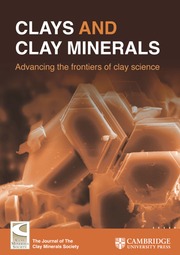Crossref Citations
This article has been cited by the following publications. This list is generated based on data provided by
Crossref.
Blanc, Philippe
Legendre, Olivier
and
Gaucher, Eric C.
2007.
Estimate of clay minerals amounts from XRD pattern modeling: The Arquant model.
Physics and Chemistry of the Earth, Parts A/B/C,
Vol. 32,
Issue. 1-7,
p.
135.
Lanson, Bruno
2011.
Layered Mineral Structures and their Application in Advanced Technologies.
p.
151.
Colas, E.
Mertz, J.D.
Thomachot-Schneider, C.
Barbin, V.
and
Rassineux, F.
2011.
Influence of the clay coating properties on the dilation behavior of sandstones.
Applied Clay Science,
Vol. 52,
Issue. 3,
p.
245.
Kang, Il-Mo
Hillier, S.
Song, Yungoo
and
Kim, In-Joon
2012.
Relative coherent stacking potential of fundamental particles of illite-smectite and its relationship to geological environment.
Clay Minerals,
Vol. 47,
Issue. 3,
p.
319.
Sakharov, B.A.
and
Lanson, B.
2013.
Handbook of Clay Science.
Vol. 5,
Issue. ,
p.
51.
Sakharov, B. A.
Drits, V. A.
McCarty, D. K.
and
Walker, G. M.
2016.
Modeling Powder X-ray Diffraction Patterns of the Clay Minerals Society Kaolinite Standards: KGa-1, KGa-1b, and KGa-2.
Clays and Clay Minerals,
Vol. 64,
Issue. 3,
p.
314.
Kuligiewicz, Artur
Derkowski, Arkadiusz
Środoń, Jan
Gionis, Vassilis
and
Chryssikos, Georgios D.
2018.
The charge of wettable illite-smectite surfaces measured with the O-D method.
Applied Clay Science,
Vol. 161,
Issue. ,
p.
354.
Kageshima, Yosuke
Tateyama, Shutaro
Kishimoto, Fuminao
Teshima, Katsuya
Domen, Kazunari
and
Nishikiori, Hiromasa
2021.
Photocatalytic oxygen evolution triggered by photon upconverted emission based on triplet–triplet annihilation.
Physical Chemistry Chemical Physics,
Vol. 23,
Issue. 9,
p.
5673.
Drits, Victor A.
Zviagina, Bella B.
Sakharov, Boris A.
Dorzhieva, Olga V.
and
Savichev, Aleksandr T.
2021.
New Insight into the Relationships Between Structural and Ftir Spectroscopic Features of Kaolinites.
Clays and Clay Minerals,
Vol. 69,
Issue. 3,
p.
366.
Drits, V. A.
Sakharov, B. A.
and
Zviagina, B. B.
2023.
Structural and Crystal-Chemical Features of Mixed-Layer Illite-Containing Minerals from Catagenetically Altered Upper Jurassic Oil-Source Rocks.
Lithology and Mineral Resources,
Vol. 58,
Issue. 3,
p.
183.
Drits, V. A.
Sakharov, B. A.
and
Zviagina, B. B.
2023.
Structural and Сrystal-Сhemical Features of Mixed-Layer Illite-Containing Minerals from Diagenetically Altered Upper Jurassic Oil Source Rocks.
Литология и полезные ископаемые,
p.
215.
Bastida, Joaquín
and
Pardo-Ibañez, Pablo
2024.
Applications of X-ray Powder Diffraction Microstructural Analysis in Applied Clay Mineralogy.
Minerals,
Vol. 14,
Issue. 6,
p.
584.


